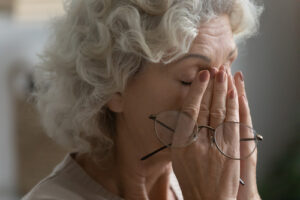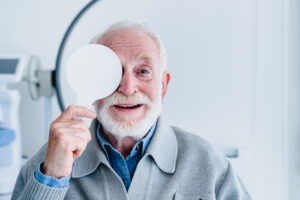Macular degeneration is the leading cause of vision loss in older Americans, affecting one in ten individuals over the age of fifty. By age eighty, it is estimated that three in ten individuals are in the early stages of this debilitating eye disease, while one in ten are in the late stages and most likely have some degree of vision loss.
These statistics illustrate how macular degeneration is one of the most common age-related eye conditions. Keep reading to learn more about macular degeneration, including who is most at risk for developing it!

What is Macular Degeneration?
Macular degeneration is caused by damage to the macula, which is the part of the retina that is responsible for central vision. When affected by macular degeneration, the tissue in the macula is damaged, affecting the ability of the retina to see things that are directly in front of a person.
The impairment or loss of central vision caused by macular degeneration can impact your ability to read, drive a car, and recognize faces. While the most severe cases of the disease can result in a total loss of vision, often a person’s peripheral vision, or the ability to see things off to the side, is not affected.
Macular degeneration can affect one or both eyes.
What Are the Types of Macular Degeneration?
There are two types of macular degeneration: dry macular degeneration and wet macular degeneration:
Dry Macular Degeneration
Dry macular degeneration is the most common type of the disease. It is usually a result of aging and progresses slowly, taking years to fully develop.
Dry macular degeneration occurs when protein deposits called drusen form under the macula, causing the cells of the macula to thin and atrophy. It is most common in individuals over the age of fifty, who often are not aware they have the disease until their vision has been significantly impaired.

Wet Macular Degeneration
Wet macular degeneration is a less common but more severe type of the disease. It often comes on suddenly, causing significant damage that is more likely to result in total vision loss.
Wet macular degeneration occurs when abnormal blood vessels develop under the retina and macula. These abnormal blood vessels leak fluids which form a bulge under the macula, causing a dark spot in the center of your vision.
By the time these spots appear, the disease is already at an advanced stage.
What Are the Signs and Symptoms of Macular Degeneration?
Because the most common type of macular degeneration, the dry form, develops very slowly, the signs and symptoms of the condition may be relatively unnoticeable at first.
These signs and symptoms include:
- Changes to quality of vision, including blurred or wavy vision
- Distorted vision, such as perceiving straight lines as bent
- Loss or impairment of the central field of vision
- Changes to the way you see colors
- Difficulty adapting to low light levels
- The sudden appearance of dark spots in your central vision
What Are the Risk Factors for Macular Degeneration?
While anyone can develop macular degeneration, there are certain factors that can put an individual at a higher risk for developing this eye condition. These factors include:
Age
Age is the primary risk factor for developing macular degeneration. This is because as you age, the tissue in the macula may thin and lose the cells responsible for vision.
Macular degeneration is most often diagnosed in individuals over the age of fifty, with an increased risk for individuals who are sixty-five and older. It is estimated that thirty percent of individuals over the age of seventy-five have some degree of macular degeneration.

Genetics
If you have a family history of macular degeneration, you are far more likely to develop this condition yourself. Recent research into the causes of macular degeneration has led to the identification of several genes associated with an increased risk of diagnosis.
Smoking
A smoking habit is not only unhealthy for your heart and lungs, but it can also increase your risk of macular degeneration. Smoking damages the blood vessels in the eye, leading to decreased blood flow and nutrient delivery to the retina.
Studies have shown that smokers are two to four times more likely to develop the disease than non-smokers. If you are diagnosed with macular degeneration, continuing to smoke can accelerate the progression of the disease.
High Blood Pressure
When blood pressure is elevated, it can cause damage to the blood vessels in the eye, leading to decreased blood flow to the retina. Like smoking, uncontrolled high blood pressure can accelerate the damage to vision caused by macular degeneration.
What Treatments Are Used for Macular Degeneration?
Currently, there is no cure for macular degeneration or treatments that can reverse the visual impairment caused by the eye condition. However, there are treatment options that can limit vision damage or impairment.

These options include vision-specific vitamin supplement routines; low vision rehabilitation and aids; medications that can reduce the growth of abnormal blood vessels in the eye; and laser therapies. Consulting with an experienced eye doctor is the best way to learn what treatments would be most beneficial for you.
You can ensure you catch macular degeneration in its earliest stages by knowing your risk factors and scheduling routine comprehensive eye exams, which include specific tests for macular degeneration. As with so many health conditions, education, and early diagnosis is the best way to prevent macular degeneration from leading to serious loss of vision!
Do you want to learn more about macular degeneration or have your eyes checked to ensure you’re not at risk for vision loss? Schedule an appointment at Nevada Eye Physicians in Henderson, NV, today!



